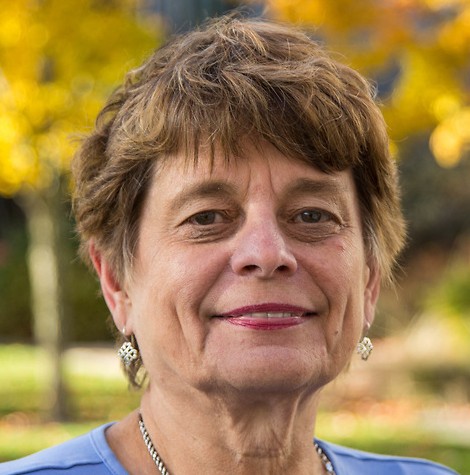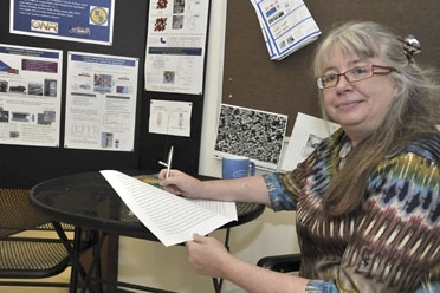Page 38 • (1,590 results in 0.018 seconds)
-

Sheri Tonn, Ph.D. Professor Emeritus of Chemistry Phone: 253-535-7552 Email: tonnsj@plu.edu Professional Education Postdoctoral Fellow and Instructor, University of Minnesota in St. Paul, 1976-1979 Ph.D., Northwestern University, 1976 B.S., Oregon State University, 1971 Responsibilities CHEM 115 – General Chemistry I CHEM 116 – General Chemistry II CHEM 403 – Biochemistry CHEM 410 – Introduction to Research Accolades 2017 "Inspirational Woman" - PLU Center for Gender Equity
-
served in a bowl filled with sticky rice, fresh veggies, romaine lettuce, cucumber kimchi, green onions, katsu sauce, mayo & furikakeCrispy Chik’n Patty Katsu Bowl$8.69vegetarianeggglutensesamesoyAlpha crispy chik’n patty served in a bowl filled with sticky rice, fresh veggies, romaine lettuce, cucumber kimchi, green onions, katsu sauce, mayo & furikakeAGLIO Sausage Pizza by the Slice$3.99dairyglutenporksoyCheese Pizza by the Slice$3.99vegetariandairyglutensoyTAMARI Custom Deli Sandwich$5.99Sides
-
Scholarships from the American Chemical Society Puget Sound Section – Deadline April 1 The Puget Sound Section of the American Chemical Society (ACS PSS) awards two $1500 scholarships to chemistry majors studying at 4-year colleges and universities in the Puget Sound Section of the ACS. This scholarship is named after Julia Rutherford, a PLU chemistry major who was… March 15, 2015
-

September 5, 2012 Researcher looks at how climate change leads to innovative science On Sept. 7, the PLU Chemistry department will host a seminar by Debra Rolison in Morken 103 from 12:30-1:35 pm. In her presentation, “How Subversion, Revolution, and Climate Change Lead to Innovative Science–Enhancing Electrochemical Energy Storage on the Macroscale via Architectural Design on the Nanoscale,” Rolison will share her passion for empowering women and minorities in the sciences, and will give an
-
Chemistry Department Learning OutcomesThe major program outcomes of the Chemistry Department’s curriculum are: Students will demonstrate an understanding of the fundamental concepts of chemistry by using critical thinking and analytical skills to solve chemical problems. Students will conduct experiments and demonstrate proficiency with appropriate lab skills, techniques, and instrumentation. Students will demonstrate the ability to search, understand, and put into use chemical literature as
-
2016 Linus Pauling Medal Award Press Release The American Chemical Society (ACS) Oregon, Portland, and Puget Sound Sections have named Dr. Timothy Swager, John D. MacArthur Professor of Chemistry at Massachusetts Institute of Technology, the 2016 recipient of the Linus Pauling Medal Award. Dr. Swager’s work has had impact on multiple areas of supramolecular chemistry and materials science, and reflects the spirit of Linus Pauling’s legacy. He is known for his work in innovative polymer and
-
Dean Waldow's Research Group Pacific Lutheran University chemistry professor Dr. Dean Waldow has been recognized for his 27 years of research and mentorship at PLU with the Lynwood W. Swanson Scientific Research Award. Dr. Waldow recognized with Lynwood W. Swanson Scientific Research Award - click here to read the storyRead about Dr. Waldow in the Tacoma News Tribune! Left to right: Dr. Dean Waldow, Aminda, Phyllicia, Hannah, Andrew, and Lance – May 2019 This site hosts information about my
-
) website. Candidates for DAT should have completed prerequisite courses in biology, general chemistry, and organic chemistry. The exam consists of four separate parts: Natural Sciences (biology, general chemistry, and organic chemistry) Perceptual Ability (2, 3-D problem-solving) Reading comprehension (dental and basic sciences) Quantitative reasoning Specifically, the DAT consists of 280 multiple-choice test questions. The Survey of the Natural Sciences section consists of Biology (40 questions
-
) website. Candidates for DAT should have completed prerequisite courses in biology, general chemistry, and organic chemistry. The exam consists of four separate parts: Natural Sciences (biology, general chemistry, and organic chemistry) Perceptual Ability (2, 3-D problem-solving) Reading comprehension (dental and basic sciences) Quantitative reasoning Specifically, the DAT consists of 280 multiple-choice test questions. The Survey of the Natural Sciences section consists of Biology (40 questions
-
/galvanostat/ZRA Gamry Ref 600+ potentiostat/galvanostat/ZRA Two Raman Spectrometers Cary 5000 UV/VIS/NIR HP 8453 UV-vis absorbance spectrometer Aminco Bowman spectrofluorometer Glass Contour five solvent purification system Bruker inert atmosphere glove box Barnstead water purification system (18 MΩ-cm resistivity) Chemistry Laboratory Safety at PLU The PLU Chemistry Department has a safety program that allows for effective and safe work in our laboratories for students, staff, and faculty. Please visit
Do you have any feedback for us? If so, feel free to use our Feedback Form.


